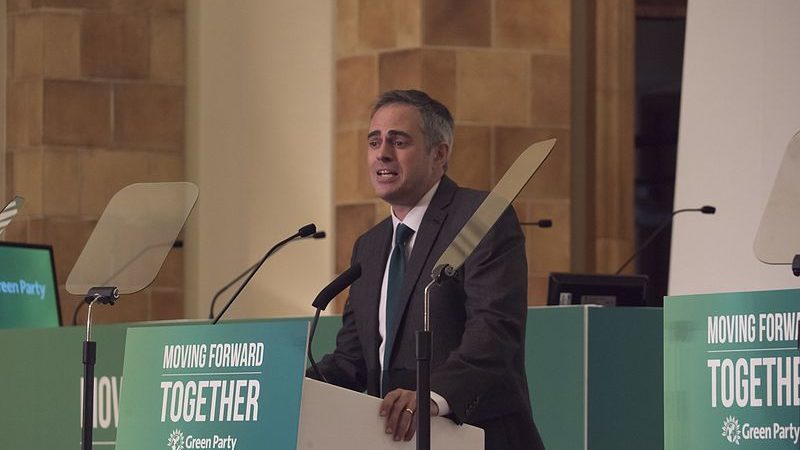We now have an insurgent left-wing Labour party in this country - does this make the Greens redundant?

I went to the Green Party conference this weekend expecting my growing ambivalence towards the party to be reinforced.
We now have an insurgent left-wing Labour party in this country, and that’s a good thing; a Corbyn government would radically improve material conditions for millions of people, and for any of us on the left to pretend otherwise is disingenuous. I have become increasingly frustrated by many Green Party members’ refusal to engage with this new landscape and the dilemmas it throws up.
But while I did find a mood much less dynamic than previous conferences, I also found reasons to be positive.
In his speech, Jonathan Bartley claimed ‘I believe that we will be the most influential party of the 21st Century.’ This in itself is at best wildly optimistic and at worst patently absurd – but behind it is an important truth.
As Jonathan went on to say, ‘In 2010 we were told by the Tories, by Labour, by the Lib Dems – that austerity was the only answer. We bravely dared to be different. What we were saying then – that neoliberalism is dying and must be replaced – has become the mainstream.’
Before Corbynmania, there was the ‘Green surge’: a wave of support for a radical left-wing party which opposed austerity, championed public ownership, and questioned some fundamental assumptions about the economy and society. We lost the momentum. But the impact we had should not be underestimated. The Overton window – the range of policies considered politically acceptable by the public – is malleable, and can be shifted by voices pushing at its margins. Until Corbyn’s election as Labour leader, Greens were that voice on the left.
In 2015, we called for a £10 per hour minimum wage, renationalisation of the railways and free education. This May, Labour won nearly 13 million votes on a remarkably similar platform. That’s a huge vindication of what Greens have been fighting for for years.
This isn’t about taking credit – although there are many activists, from those who for years worked internally to make the Greens a radical left-wing party, to those who tirelessly knocked doors to make us an electoral threat in local areas, who now seem to be rewarded only by their own party’s declining relevance. It is about recognising the genuinely crucial role that the Green Party has played in shifting the political landscape, and thinking carefully about how we can continue to be that force.
That thinking is clearly being done by the party leadership. Jonathan’s speech lay out the beginnings of a radical vision that goes above and beyond Labour’s: replacing Universal Credit with a Universal Basic Income; a mutually owned and publicly-regulated Uber; asking, fundamentally, ‘who the economy is for.’
At conference however this wasn’t reflected in the concerns of members. Among the motions brought to the floor were not one but two which called for a re-focusing of our messaging to highlight ecology and climate change, while it seemed that much more time was dedicated to internal and organisational issues than to updating or strengthening policy.
But shunning social and economic issues in favour of a retreat to a narrow ‘deep green’ vision of environmentalism would be the death of our electoral chances and, ultimately, of any potential we might have to genuinely influence climate policy in this country. If we keep being imaginative, bold and forward-looking in all our policy areas, we have a chance to remain the vanguard of the radical left.
Even then, there are big questions to be answered about electoral tactics. Members will not accept a re-run of the progressive alliance strategy. But I doubt I am the only Green reluctant to pour my time and energy into campaigning against decent Labour MPs, for Green candidates unlikely to win the seat, when there are scores of Tories with wafer-thin majorities just a few action days away from being unseated by Labour.
One part of the answer to this is a sharp focus on local elections, which was clearly at the fore this conference. Amelia Womack highlighted the work of Alison Teal who has stood up against the Labour council in Sheffield in the battle to save the city’s street trees – just one example of Green councillors holding Labour to account. There is in many places a real disconnect between Labour’s national policy platform and its actions locally, and a strong showing for a radical left-wing Green Party in the May elections would send a message to the Labour councils that too often take their voters for granted.
There’s no pretending this isn’t a tough time for the Greens. There are no easy answers. But I left conference certain that there is still a place for us in British politics, and a real need for strong left-wing voices within the party. The urgent task now is keeping those voices there and making them heard.
Georgia Elander is a member of the Green Party. She tweets here.
Left Foot Forward doesn't have the backing of big business or billionaires. We rely on the kind and generous support of ordinary people like you.
You can support hard-hitting journalism that holds the right to account, provides a forum for debate among progressives, and covers the stories the rest of the media ignore. Donate today.




16 Responses to “Do we still need the Green Party?”
Andy Pratt
An interesting article, and some very good comments below. I agree we really need the Greens as a seperate force. Look at Corbynistas on economic growth (do they question it at all?), Brexit (taking an old Trotskyite position) and fair votes/democracy (a big silence). Yes the Greens need to work with Labour wher possible. Yes we need to emphasise our ecological policies. AND our anti capitalist policies (and yes without ‘scaring the horses’!) Anyway how nice to read thoughtful comments for a change.. thanks to all!